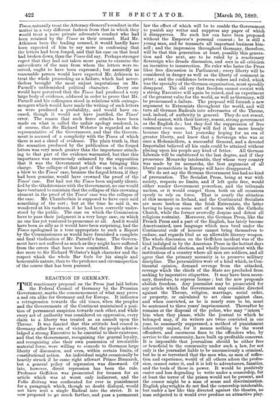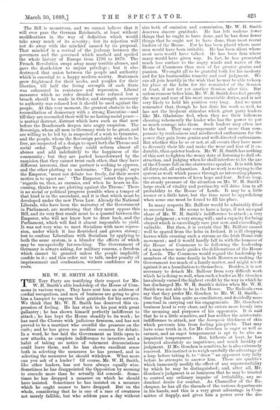REACTION IN GERMANY. T HE reactionary proposal on the Press just
laid before the Federal Council of Germany by the Prussian Government, marks the commencement of what may prove a sad era alike for Germany and for Europe. It indicates a retrogression towards the old times, when the peoples and the Governments of the Continent maintained a posi- tion of permanent suspicion towards each other, and while every act of authority was considered an oppression, every claim to a liberty was treated as an assault upon the Throne. It was fancied that this attitude had ceased in Germany after her era of victory, that the people acknow- ledged a strong Executive to be essential to their existence, and that the Government, recognising the general loyalty, and recognising also their own possession of irresistible material force, were willing to concede to Germans large liberty of discussion, and even, within certain limits, of constitutional action. An individual might occasionally be heavily struck if he came right athwart Prince Bismarck, but a general policy of repression was disowned. Of late, however, direct repression has been the rule. Professor Geffcken was prosecuted for treason for an article which was at worst only indiscreet, and the VoUcs Zeitung was confiscated for ever in punishment for a paragraph which, though no doubt disloyal, would not have sent a single Radical into the street. It is now proposed to go much farther, and pass a permanent law the effect of which will be to enable the Government to punish any writer and suppress any paper of which it disapproves. No such law can have been proposed without the Emperor's personal consent ; he is still a young man, and he transacts all important business him- self ; and the impression throughout Germany, therefore, will be that this generation at least, possibly this genera- tion and the next, are to be ruled by a reactionary Sovereign who dreads discussion, and sees in all criticism an incentive to insurrection. No ruler who hates the Press likes free discussion in Parliament ; every liberty will be considered in danger as well as the liberty of comment in print ; and the confidence between rulers and ruled, which was the specialty of the German organisation, must speedily disappear. The old cry that freedom cannot coexist with a strong Executive will again be raised, and an experiment of the greatest value for the world, as well as Germany, will be pronounced a failure. The proposal will furnish a new argument to Extremists throughout the world, and will turn all German Radicals into adversaries of the Throne, and, indeed, of authority in general. They do not resent, indeed cannot, with their history, resent, strong government as the English do ; but they feel the suppression of free comment even more. They will feel it the more keenly because they were but yesterday hoping for an era of greater liberty, and knew that a Sovereign who was at once a Hohenzollern, a successful General, and a devoted Imperialist believed all his ends. could be attained without placing upon his people any kind of fetter. All German Liberals will be embittered to the last degree, and if they pronounce Monarchy intolerable, they whose very country was made by its monarchs, the best argument of all liberal monarchists in Europe will have disappeared. We do not say the German Government has had no kind of provocation. The Socialist Press, being at war with society, respects no limits, and if left quite free, would either render Government powerless, and the tribunals useless, or it would compel them both on all occasions openly to rely on force. That is nearly the situation at this moment in Ireland, and the Continental Socialists are more lawless than the Irish Extremists, the latter having to keep on some sort of terms with the Catholic Church, while the former avowedly despise and detest all religious restraint. Moreover, the German Press, like the French Press and a part of the English, has lately become Americanised, uses language which men bred under the Continental code of honour cannot bring themselves to endure, and regards libel as an allowable literary weapon. The whole discussion on the Geffcken incident was of the kind indulged in by the American Press in the hottest days of a, Presidential election, and wholly inconsistent with the institutions of a country where all men are soldiers, and all agree that the primary necessity is to preserve military discipline. The personalities were of a kind which, in Con- tinental opinion, demand revenge from the attacked, revenge which the chiefs of the State are precluded from seeking by imperative etiquettes. It may have been neces- sary, therefore, to repress license ; but the new proposals abolish freedom. Any journalist may be prosecuted for any article which the Government may consider directed against the Throne, religion, marriage, social order, or property, or calculated to set class against class, and when convicted, as he is nearly sure to be, must be sentenced to three years' imprisonment. Thereafter he remains at the disposal of the police, who may " intern " him when they please, while the journal to which he belonged may, if its writers are twice convicted in one year, be summarily suppressed, a method of punishment inherently unjust, for it means nothing to the worst offenders, and enormous fines to the offenders who, by service to the community, have built up profitable concerns. It is impossible that journalism should be either free or beneficial to the community under such a law, for not only is the journalist liable to be unconsciously a criminal, but he is so terrorised that the men who, as men of reflec- tion and experience, would of all others adorn the profes- sion, cannot enter it, and it is left to adventurers, fanatics, and the tools of those in power. It would be positively easier and less degrading to write under a censorship, for at least the terror of the prison would not be present, and the censor might be a man of sense and discrimination. English playwrights do not find the censorship intolerable, but under a law like this directed against the theatre, no man subjected to it would ever produce an attractive play. The Bill is monstrous, and we cannot believe that it will ever pass the German Reichsrath, at least without modifications in the way of definition which would take away much of its severity ; but its rejection will not do away with the mischief caused by its proposal. That mischief is a revival of the jealousy between the governors and the governed which marked and spoiled the whole history of Europe from 1793 to 1870. The French Revolution swept away many terrible abuses, and gave the death-blow to unjust privilege ; but it also destroyed that union between the people and authority which is essential to a happy modern society. Statesmen grew frightened for their necks, and peoples for their liberties, till half the living strength of each State was exhausted in resistance and repression. Liberal measures which no ruler dreaded were refused lest a breach should be made in Order, and strength necessary to authority was refused lest it should be used against the people. At this very moment, the greatest obstacle to the reconciliation of democracy with a strong Executive—and till they are reconciled there will be no lasting social peace— is mutual distrust, distrust which laws such as that now before the Bundesrath deepen into angry suspicion. The Sovereign, whom all men in Germany wish to be great, and are willing to be led by, is suspected of a wish to tyrannise, and the people, whom the Sovereign probably wishes to be free, are suspected of a design to upset both the Throne and social order. Together they could reform almost all abuses and add indefinitely to the happiness of the community ; but they are parted henceforward by the suspicion that they cannot trust each other, that they have different interests, that one partner is seeking to oppress, and the other plotting to undermine. The people,' says the Emperor, must not debate too freely, for their secret motive is to upset me.' The Emperor,' retort the people, 'regards us, then, as enemies, and when he hears us dis- cussing, thinks we are plotting against the Throne.' There is no social or political progress possible when a temper of that kind is in the ascendant, and it is that which must be developed under the new Press Law. Already the National Liberals, who have been the mainstay of the Government in Parliament, are muttering that they must oppose this Bill, and its very first result must be a quarrel between the Emperor, who will not know how to draw back, and the Parliament, which will find it almost impossible to yield. It was not very wise to meet Socialism with mere repres- sion, under which it has flourished and grown strong ; but to confuse Liberalism with Socialism by applying to both the same system, is a blunder the effects of which may be unexpectedly far-reaching. The Government of Germany is always asking, for military reasons, a freedom which cannot be granted unless the people implicitly confide in it ; and this order not to talk, under penalty of imprisonment and confiscation, withers confidence at its roots.



















































 Previous page
Previous page